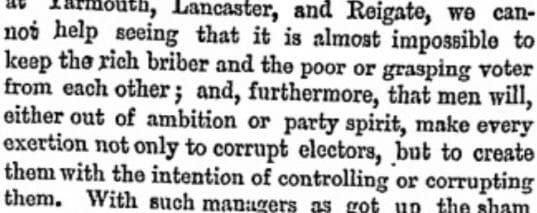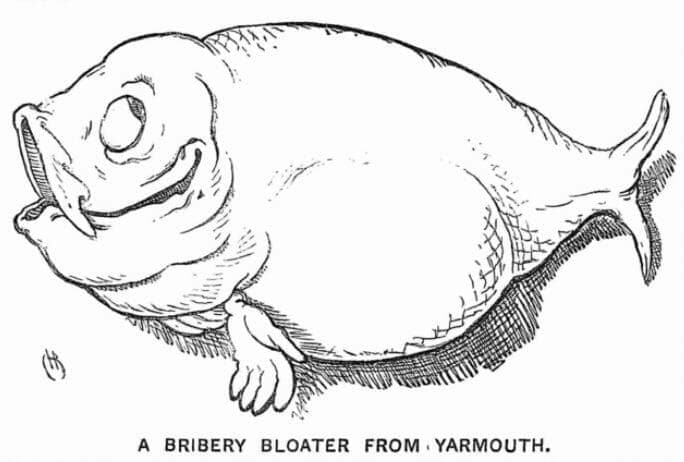│By Ellen Grace Lesser, Gale Ambassador at the University of Exeter│
We have all heard the maxim, “Power corrupts”. This has been altered in recent years, and now you may hear an alternative: “Power brings out people’s true colours”. It is not that power necessarily makes anyone “bad”, but that if a person is already “bad”, this is highlighted when they gain power. Yet is it the power itself that does this to people, or is it the desire for power? In this post, I will investigate the coverage of political bribery scandals from sources in The Sunday Times Digital Archive and The Times Digital Archive to see where the corrupting power of power truly lies.
1836: The Whigs and the Tories
In 1836, The Sunday Times reported on a scandal brewing in the British Parliament. The Whigs and the Tories, two opposing political parties, were making accusations of each other. On the one hand, the Whigs were accusing the Tories of bribing voters for seats. On the other hand, the Tories were accusing the Whigs of bribing voters for seats. The Tories had facts and figures on their side: allegedly, the Whigs had spent £100,000 on electoral bribes.
Watching from the sidelines, The Sunday Times dismayed the accusations, all while pointing out the irony in them: both parties were accusing the other, but neither were willing to say specifically that bribery should be avoided in any case. Bribery, it would seem, is only “bad” when the other side are doing it.

The reporter is clear that they side with neither of the parties; rather, they “stand for the poor voters against both [parties]. We plead for their protection against intimidation; and no less for their protection against corruption”. The language is strong and clear: bribery, on the side of the briber, is intimidation; and on the side of the bribed, is corruption. Yet it is the system itself which allows this to happen, and the reporter calls out for legislation against such practices.
1854: A Show of Repentance
Twenty years later, The Times too laments the system which allows for seats and votes to be bought by political candidates. These two decades have, however, brought about a more pessimistic worldview; rather than calling out for legislation, the reporter is here lamenting that legislation will probably change nothing: “So long as office and promotion in office are given to favour, it is impossible but that the system of political influence should continue, and, with it, that of “undue influence at elections of members of Parliament.””

Like churchgoers who receive absolution every Sunday only to spend the rest of the week sinning, the reporter accuses Parliament of making a show of attempting to change before returning to their old ways. The shift is clear: the system allows this to happen, and a solution within the system will not do; if this is to stop, the system needs to change.
1867: The Totnes Bribery Commission
By the 1860s, reports of bribery scandals are becoming more common. The Times reports in 1867 on the Totnes Bribery Commission, set up to investigate instances of bribery and vote manufacture in a Totnes election. Throughout the article, they reference to other bribery scandals which have come to light: in Yarmouth, in Lancaster, and in Reigate. Not only that, but bribery was becoming so common that a banker in Totnes described how he would not keep track of notes around election time in case the money he was handling was being used for bribes.
There is little to no hope for this reporter. Where in the 1830s, The Sunday Times hoped that legislation would solve the issue; and in the 1850s, The Times hoped that an altering of the system would bring about positive change; in the 1860s, The Times has given in to pessimism:

The article ends with the lamentation: “The practice of manufacturing votes as it exists already shows what we may expect whenever wealth, ambition, and party spirit, unscrupulously served, receive new facilities from the law”. Not only would the system need to change, but they can no longer see any way to change the system.

The problem, The Times seems to have concluded, is not the logistics of the system itself, but the thought processes and attitudes which the system promotes. It is not that the system allows for bribery to benefit political success, but that within the system political power and money have worth and are desired.
On the one hand, there are those with money but without their desired level of political power (the bribers); on the other hand, there are those without money but who have political power in the ability to decide who can have their voice heard in Parliament (the bribed). The bribers will give up their money, which they have less need for, for the sake of gaining political power, which they desire enough to commit acts of bribery.
“The desire for power corrupts”
Perhaps we need to update our maxim once again. Just as we all know the saying “Money is the root of all evil” without necessarily knowing that the full saying is “The love of money is the root of all evil”, so too could our saying about power be changed. Rather than, “Power corrupts”, or “Power brings out a person’s true colours”, instead we recognise, “The desire for power corrupts”.
As evidenced in these articles from the nineteenth century, where the desire for political power is strong enough, electoral candidates may be tempted to bribe their way into Parliament. Where the desire for money and the power it represents is strong enough, voters may be tempted to accept a bribe and alter their vote accordingly.
In both cases, it is not the fault of the system or a lack of legislation which inspires bribery for political gain; rather, it is the personal gain to be had from political power which tempts those with the opportunity to grasp it to part with some of their money to give themselves that little extra advantage.
Blog post cover image citation: [Percival Leigh]. “The Utilisation of Bribery.” Punch, October 13, 1866, 150. Punch Historical Archive, 1841-1992 https://link.gale.com/apps/doc/ES700235465/GDCS?u=exeter&sid=GDCS&xid=559888ed


